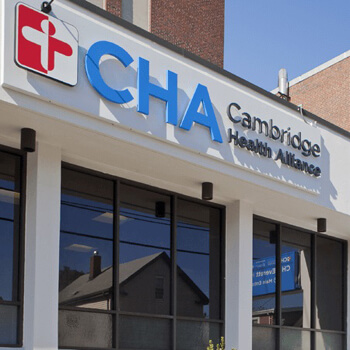One year of the Recovery Coach program

The Recovery Coach Program is making a sustainable impact in the community, one patient at a time.
By Randi Sokol, MD, MPH, MMedEd, a physician at the CHA Malden Family Medicine Center and director of faculty development and the pain/addictions curriculum for the Tufts University Family Medicine Residency at CHA.
"I remember that day quite well because it was rock bottom," commented J.D. He avoids eye contact and stares nervously at the floor, clinging to his mop. It had been over a year since he sought help for opioid use.
J.D. shared, as he tried to hide a prideful grin, that this was the first time in his life that he has been able to hold down a job longer than a year, have money, own a dog and pay child support. "I remember a year ago, sitting on the floor of my bedroom, lying against the wall and so sick. I used the day before. I was scrolling through my phone about to call and try to find drugs. But then I saw Jack's card. I was sick and tired of being sick and tired. I called Jack instead."
With Jack's help, J.D. completed a one-month inpatient addiction program and has been in recovery for 12 months, doing well on Suboxone. He has a therapist who helps him manage his anxiety and he attends AA meetings regularly.
Jack Harper is a Recovery Coach at CHA Everett Hospital and helps engage patients struggling with the relapsing nature of addiction, connecting them to recovery programs. He has been in recovery for 28 years. "I can relate to people and they see that as soon as I enter their room," he shares. "Sometimes I just listen and hold their hands. I try not to slip into my own ego and talk about myself. Instead, I sit there and witness their humanness." Jack has struggled with mental illness and addiction.
The Recovery Coach Program has been in existence for more than one-year at CHA Everett Hospital. The two recovery coaches have engaged nearly 500 patients, most of whom were connected with community-based services to guide them through long-term support. Watch a short video about the program.
"When patients are approached by a recovery coach who acts as a peer mentor, their guard goes down, they feel less judged, and they are more likely to engage in care," noted Rebecca Sweeney, Senior Director of Care Management. She helped spearhead the initiative and sees deep value in it as an entry point to recovery.
CHA's Chief of Emergency Medicine, Benjamin Milligan, MD, believes this approach supports high-quality care. "When patients enter recovery without medication-assisted treatment, they have a 90% chance of relapsing in the first year. With medication, 50-60% will remain in recovery a year later," commented Dr. Milligan.
"It's been a collaborative effort across the ED, inpatient psychiatry, hospitalist services, outpatient primary care and specialty addiction services," explains Ellie Grossman, MD, a physician at Somerville Campus Primary Care and primary care lead for behavioral health integration. "CHA providers have been working together to create one system that supports some of our most vulnerable patients."
CHA is at the forefront of treating addiction with 13 primary care sites, all offering medication for addiction and integrated behavioral health services. Now, as we celebrate the one-year anniversary of the Recovery Coach Program, we are reminded of the beautiful story of Jack and J.D.
*Please note that some names and identifying details have been changed to protect the privacy of individuals.
Disclaimer
This articles provide general information for educational purposes only. The information provided in this article, or through linkages to other sites, is not a substitute for medical or professional care, and you should not use the information in place of a visit, call consultation or the advice of your physician or other healthcare provider.